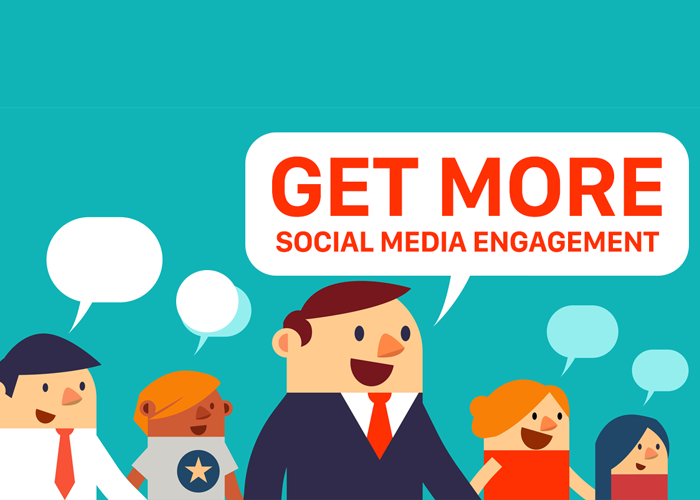Successful marketing depends on creating an omnichannel customer experience that is integrated across platforms, and that includes leveraging social media engagement as a means of reaching customers.
People spend hours every day on their phones and on social media. If you’re not capturing at least some of their attention, for example by more Instagram engagement, you are wasting your time.
Social Media Engagement
You should be treating social media engagement like a dinner party, welcoming people and encouraging conversation between the host and the guests.
What Is Engagement?
When it comes to social media, engagement measures how engaged an audience is with content. Some standard metrics that are used to gauge engagement include likes, comments, social shares, saved items, click-throughs, or retweets.
Engagement helps to assess how your content is perceived by your audience based on their interest in and reactions to what you share.
Engagement is a two-way street, however. To create brand loyalty and start a conversation with your customers and followers, you should engage back when they interact with you or your business on social media.
Respond to comments, follow and engage with similar or local businesses, and answer questions when they are asked online. This will create a stronger connection between your business and your customers and exemplify your commitment to customer service.
What is Social Media Engagement?
In the past, businesses that wanted to communicate with their customers did so by purchasing television, radio or print advertising. These mediums facilitate a one-way conversation: the company prints a message and spends money to get their message in front of customers, customers read the message and respond to it by visiting the store and making a purchase.
Social media has fundamentally changed the way that communication works between businesses and their customers, essentially creating a public forum for communication between the business and all of its customers. Communication between businesses and their customers is now a two-way street, enabling customers to engage with their favorite brands in completely new ways.
Social media engagement is a measurement of how effectively a company is creating interactions with its customers in the social stream.
Also Read:
The Benefits of Blogging for Social Marketing and Personal Branding
Different Social Media Engagement
Depending on which social media platforms you use, engagement may mean different things. We’ve broken down how the major social networks define and measure engagement.
Facebook: Facebook engagement can be measured by likes, reactions, comments, shares, and some clicks on links, photos, or videos. You can measure Engagement rates on Facebook by engaged users, not total engagements; if someone likes and comments on the post, that counts as two engagements, but one engaged user. Total engaged users are divided by the post’s reach to find the engagement rate.
Twitter: Twitter engagements are retweets, replies, follows, favorites, tweet expansion, or clicks on links, hashtags, embedded media, the username, or the profile picture. Engagement rates are calculated by adding all of these engagements up and dividing by total impressions.
Instagram: Instagram defines engagements as likes, comments, and saves on a post. There are a few ways to calculate Instagram engagement rates, and some Instagram users include or omit other factors like shares. To calculate an engagement rate, Instagram takes these metrics and divides by the total impressions.
Why is Social Media Engagement Important for Businesses?
Whether you are on social media or not, it’s an inescapable truth that your customers are paying attention to their social media accounts for up to two hours or more each day. Establishing a social media presence, building a following and engaging them effectively with quality content is a big effort, but what benefits can you expect to glean from your investment in social media? Here are just a few ways that social media engagement can have a positive effect on your business:
- Social Media Engagement Offers Social Proof of Your Business
Social media engagement isn’t simply the number of Instagram followers you have or the number of “Likes” you’ve accumulated on your business Facebook page, although those things do make a difference when it comes to how your business is perceived by a prospective customer.
If someone visits your business page and sees that you’ve got a large fan base, that offers the same kind of social proof as a celebrity endorsement or a testimonial from a satisfied customer. When someone visits your page and your business looks popular, people think “Well, if all of these people are happy customers, maybe I’ll be a happy customer too!” – making them much more likely to purchase your product or service.

Why is Social Media Engagement So Important?
- Social Media Engagement Expands Your Marketing Reach
Social media platforms are global, meaning that fans and customers of your business can engage with you from anywhere in the world. In the past, even businesses that could operate globally were restricted by the difficulties of advertising to a global customer base, but social media allows companies of any size to reach potential customers wherever they can be found.
For example, you can use this article’s tip in you Facebook marketing. With the right tools in place, your social media channels can be set up to turn those views into appointments and visits to your business. It will result in more sales.
Engagement is important on social media
- Social Media Engagement is More Cost Effective than Traditional Advertising
One of the limitations of traditional advertising me if you send a printed flyer to 500,000 people or 5,000, while it costs the same amount to print and mail each one, it will be much more expensive to print 500,000. On the other hand, social media engagement campaigns that produce a lot of shares can generate a lot more views and publicity for your business than a paper flyer ever could – all for a one-time cost.
A single person sharing or re-tweeting a message from your company could reach hundreds or even thousands of people for virtually no cost! Businesses that miss out on this with social media strategies that don’t generate engagement are losing a major opportunity.
- High Social Engagement Boosts Brand Awareness
Each time an individual interacts with your brand on social media, overall awareness of your brand will increase. If a customer likes your Facebook page or one of your posts, friends and followers of that person will see that engagement, followers of your brand may see that engagement, and overall awareness of your brand increases.
How to increase social media engagement
While you could just cross your fingers and hope that your followers just start spontaneously getting chatty, chances are, they may need a little encouragement.
Luckily, there are plenty of tricks of the trade to boost that engagement:
- First, analyze your engagement
Jot down your current number of followers, how many comments and shares you’re getting on average per post, or whatever numbers are meaningful to you.
Then make sure to keep tracking regularly so that you catch jumps or dips in engagement that can give you valuable clues about what’s working (or, just as importantly, what’s not).
- Select your strategy
Of course, there’s no one-size-fits-all solution. Since every company’s business goals are different, every company’s social media strategy will be too.
Depending on what suits your brand and what your business has to offer, your social media engagement goals might include:
- Changing public perception of your brand
- Developing new customer leads
- Collecting feedback about new products
- Educating your audience with resources and advice
Also Read:
How to Get More Views On YouTube ? Channel Optimization
Increase social media engagement
- Know your audience
The sort of language, tone, and resources that resonate are likely going to be different for a skateboarding company versus a gardening supply shop.
Knowing your target audience will also help you determine:
- What social media sites to be on
- When to publish
- Type of content
- Brand voice
- Create and share valuable content
Now that you know who is following you and why you want to reach them you’re ready for the important third ‘W’: what the heck do I tell them.
create great content that is helpful to the audience. It can addresses their needs and pain points. Think “conversation” not “broadcast.”
If you’re just talking about how great your brand is, or what you have for sale, it’s going to be harder to connect.
Don’t be afraid to get creative with these post ideas:
- Contests (Facebook contests, for example)
- Asking questions
- Polls
- Encouraging your audience to ask you questions (try an “Ask Me Anything” session)
- Test their knowledge
- Media upload contests
- Animated gifs
- Spotlighting customers
- Custom Instagram Stories stickers or filters
Increase your engagement
- Show your human sign
It’s way more tempting to engage with a brand when you think there’s a real person on the other end. And there is! (…Right?) So don’t hide it.
A lot of brands encourage their social team to personally sign-off on their posts.
But beyond names, there are lots of ways to get personal:
- Go beyond retweeting and liking and comment to start a conversation
- Acknowledge and answer questions
- Respond to comments with humor or warmth
- Show the people behind the brand in photos or videos
Summary
Social media engagement is more than just the accumulation of followers across social platforms. It’s also a measurement of how many people are paying attention to you. Or how may people are interacting with your brand on a daily basis. Businesses that focus on building their social media engagement can benefit from better marketing reach and ROI, and a greater brand awareness that makes it easier to attract new customers.
Search engines may also be paying attention to social signals and hashtags. So, they may even use them as inputs to determine search rankings for a business’ website.
Businesses can boost their social media engagement by delivering quality content. Moreover they can try engaging with and servicing their customers. They also can try offering exclusive promotions and services.



















